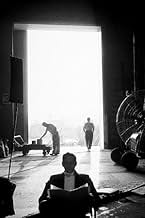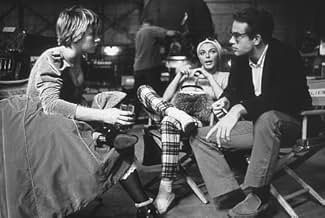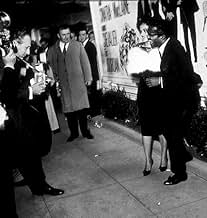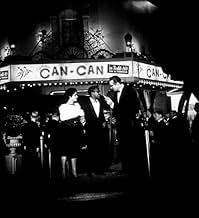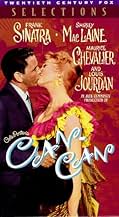IMDb रेटिंग
6.3/10
2.6 हज़ार
आपकी रेटिंग
अपनी भाषा में प्लॉट जोड़ेंIn 1896 Paris, a female nightclub proprietor fights against the forces of public morality for the right to feature her performers doing the risqué dance, the Can-Can.In 1896 Paris, a female nightclub proprietor fights against the forces of public morality for the right to feature her performers doing the risqué dance, the Can-Can.In 1896 Paris, a female nightclub proprietor fights against the forces of public morality for the right to feature her performers doing the risqué dance, the Can-Can.
- निर्देशक
- लेखक
- स्टार
- 2 ऑस्कर के लिए नामांकित
- 5 जीत और कुल 7 नामांकन
Frank Baker
- Party Guest
- (बिना क्रेडिट के)
Benjie Bancroft
- Club Patron
- (बिना क्रेडिट के)
Herman Belmonte
- Waiter
- (बिना क्रेडिट के)
Shirley Blackwell
- Townsfolk
- (बिना क्रेडिट के)
Eugene Borden
- Police Officer Chevrolet
- (बिना क्रेडिट के)
Buddy Bryan
- Dancer
- (बिना क्रेडिट के)
Carole Bryan
- Gigi
- (बिना क्रेडिट के)
फ़ीचर्ड समीक्षाएं
Another Cole Porter Broadway show makes it Hollywood, but not intact. Can Can retained most of its score, but 20th Century Fox added some other Porter standards like Let's Do It. Just One of Those Things, You Do Something To Me. And of course the book was sanitized by the Hollywood censors.
Briefly the plot is a girl who's a Can Can dancer played by Shirley MacLaine has to choose between two men of the legal profession. Upright judge, Louis Jourdan and less than scrupulous attorney, Frank Sinatra. Maurice Chevalier is an older judge who knows all of them and presides over the film like an avuncular grandfather.
The performers all do justice to the Cole Porter score and the best musical moment is Frank Sinatra's singing of It's All Right With Me. He's singing it to Juliet Prowse who was his main squeeze at the time. It's one of Sinatra's best musical moments on film, a perfect mating of singer and song.
I'm sure glad neither Sinatra or MacLaine attempted any kind of phony French accent. Sinatra tried a Spanish one in The Pride and the Passion and the results were hilarious.
Shirley MacLaine before she came to Hollywood was in the chorus of Can-Can on Broadway so she was a perfect fit for her part as Simone Pistache the cabaret owner where the illegal Can-Can is performed.
For reasons I don't understand a duet with Frank Sinatra and Maurice Chevalier singing I Love Paris was cut, though it remained in the original cast album. Blockheads at Fox, what were they thinking?
It also would have been nice to have some Paris location shooting for this film, it was all done at 20th Century's backlot where Nikita Khruschev paid a historic visit and said this was an example of western immorality and decadence. You couldn't buy that kind of publicity.
Verdict on this film, well as Old Blue Eyes sang:
RING-A-DING DING DING, C'est Magnifique.
Briefly the plot is a girl who's a Can Can dancer played by Shirley MacLaine has to choose between two men of the legal profession. Upright judge, Louis Jourdan and less than scrupulous attorney, Frank Sinatra. Maurice Chevalier is an older judge who knows all of them and presides over the film like an avuncular grandfather.
The performers all do justice to the Cole Porter score and the best musical moment is Frank Sinatra's singing of It's All Right With Me. He's singing it to Juliet Prowse who was his main squeeze at the time. It's one of Sinatra's best musical moments on film, a perfect mating of singer and song.
I'm sure glad neither Sinatra or MacLaine attempted any kind of phony French accent. Sinatra tried a Spanish one in The Pride and the Passion and the results were hilarious.
Shirley MacLaine before she came to Hollywood was in the chorus of Can-Can on Broadway so she was a perfect fit for her part as Simone Pistache the cabaret owner where the illegal Can-Can is performed.
For reasons I don't understand a duet with Frank Sinatra and Maurice Chevalier singing I Love Paris was cut, though it remained in the original cast album. Blockheads at Fox, what were they thinking?
It also would have been nice to have some Paris location shooting for this film, it was all done at 20th Century's backlot where Nikita Khruschev paid a historic visit and said this was an example of western immorality and decadence. You couldn't buy that kind of publicity.
Verdict on this film, well as Old Blue Eyes sang:
RING-A-DING DING DING, C'est Magnifique.
'Can-Can' from personal opinion is one of Cole Porter's best later musicals, and there was so much talent involved in this film. It's just sad that something that should have sparkled like diamonds fell as flat as over-egged soufflé despite some very great things.
There's more to the problem than it being a butchered treatment of the Broadway hit, including a mangled re-written story with an additional character to cater Frank Sinatra, omitted songs and changes to lyrics. Pretty much all of the problems with 'Can-Can' are to do with how it fared on its own terms, which is while nowhere near one of the duds in musicals it's one of the classics either, if anything a missed opportunity.
Despite how this all sounds there is a good amount to like about 'Can-Can'. The film is visually stunning, opulently produced and photographed with spectacular gorgeousness. Porter's music and songs, even with how they're treated (most inexplicable being the lyric liberties in the title song, the original ones are brilliant and part of what makes 'Can-Can' one of Porter's better later musicals), are still superb. Especially the very touching "It's All Right With Me", sung (or crooned) beautifully by Sinatra.
Parts of the script has wit and charm, especially with Maurice Chevalier. Chevalier and Louis Jourdan give the film's two best performances, the former performing with a humorous twinkle and effortless charm and the latter having an urbane likability. Juliet Prowse also proves herself to be a wonderful dancer, and the choreography and musical numbers are really where 'Can-Can' really picks up in the interest value.
Yet, 'Can-Can', despite the music, Chevalier and Jourdan and the production values, never makes one properly feel like they've been transported to late 19th century Paris. Part of it is to do with the mostly anachronistic and talky script (especially in the courtroom parts that really dragged the film down pace-wise), and a larger part is do with the miscasting of the two leading roles. There is no denying that Sinatra sings beautifully with impeccable phrasing and breath control, but he is too contemporary and completely fails to bring personality, let alone any endearing traits, to a total sleazebag of a character. Shirley MacLaine is also too American, annoyingly shrill and doesn't look like her heart was completely in it.
As a result of the numerous changes, despite some moments, the story suffers consequently, the material needed more wit, emotion and life than what the film provides. Sluggish pacing in the non-musical moments and a rather too overlong length doesn't help. It's indifferently directed, the "Garden of Eden" sequence despite great dancing and choreography is overblown and goes on for far too long and the ending, with Simone's decision completely ringing false, feels like a cheat.
On the whole, some definite great things but considering the source material and talent 'Can-Can' should have sparkled so much more. 5/10 Bethany Cox
There's more to the problem than it being a butchered treatment of the Broadway hit, including a mangled re-written story with an additional character to cater Frank Sinatra, omitted songs and changes to lyrics. Pretty much all of the problems with 'Can-Can' are to do with how it fared on its own terms, which is while nowhere near one of the duds in musicals it's one of the classics either, if anything a missed opportunity.
Despite how this all sounds there is a good amount to like about 'Can-Can'. The film is visually stunning, opulently produced and photographed with spectacular gorgeousness. Porter's music and songs, even with how they're treated (most inexplicable being the lyric liberties in the title song, the original ones are brilliant and part of what makes 'Can-Can' one of Porter's better later musicals), are still superb. Especially the very touching "It's All Right With Me", sung (or crooned) beautifully by Sinatra.
Parts of the script has wit and charm, especially with Maurice Chevalier. Chevalier and Louis Jourdan give the film's two best performances, the former performing with a humorous twinkle and effortless charm and the latter having an urbane likability. Juliet Prowse also proves herself to be a wonderful dancer, and the choreography and musical numbers are really where 'Can-Can' really picks up in the interest value.
Yet, 'Can-Can', despite the music, Chevalier and Jourdan and the production values, never makes one properly feel like they've been transported to late 19th century Paris. Part of it is to do with the mostly anachronistic and talky script (especially in the courtroom parts that really dragged the film down pace-wise), and a larger part is do with the miscasting of the two leading roles. There is no denying that Sinatra sings beautifully with impeccable phrasing and breath control, but he is too contemporary and completely fails to bring personality, let alone any endearing traits, to a total sleazebag of a character. Shirley MacLaine is also too American, annoyingly shrill and doesn't look like her heart was completely in it.
As a result of the numerous changes, despite some moments, the story suffers consequently, the material needed more wit, emotion and life than what the film provides. Sluggish pacing in the non-musical moments and a rather too overlong length doesn't help. It's indifferently directed, the "Garden of Eden" sequence despite great dancing and choreography is overblown and goes on for far too long and the ending, with Simone's decision completely ringing false, feels like a cheat.
On the whole, some definite great things but considering the source material and talent 'Can-Can' should have sparkled so much more. 5/10 Bethany Cox
I was all set to dislike "Can-Can" for a variety of reasons (not the least of which is Frank Sinatra cast in a musical set in 1896 France...Frank Sinatra??), but the film is a lot of fun. Sinatra and Shirley MacLaine are in good spirits throughout this pleasing adaptation of the stage-success about a dance-hall proprietress who defends her right to perform the scandalous title-named dance, deemed lascivious in its day. It runs a little too long, and MacLaine is more comfortable in her love scenes with Ol' Blue Eyes than with Louis Jourdan (who doesn't match up well with Shirley at all--he looks puny next to her), but otherwise it's surprisingly enjoyable and Juliet Prowse gives her small part as a dancer a great deal of zest. **1/2 from ****
"Can-Can" is a feeble and obvious attempt to match the wit and high professional gloss of "Gigi." The cast even included Maurice Chevalier, still enjoying the quiet pleasures of old age as a tolerant judge named Paul Barriere, and Louis Jourdan, cast here as an upright young judge named Philippe Forrestier
After Judge Forrestier becomes amorously involved with the café owner Simone Pistache (Shirley MacLaine), and legally involved with her shifty lawyer boyfriend (Frank Sinatra), he is no longer the same man
"Can-Can" is a musical film that virtually embodies the reasons for the decline of the genre in the sixties Except for its appropriately gaudy costumes and for the exuberant performance by dancer Juliet Prowse as a cancan girl, the musical is without joy or genuine style under Walter Lang's unfocused direction
The Cole Porter score reveals the composer at his most ersatz Parisian The two of the central roles are grotesquely miscast: Sinatra, who seems to have arrived to Paris by way of New Jersey, creates no discernible or even vaguely likable character in François MacLaine does well in the musical portions, but her Pistache is simply shrill and unappealing Maurice Chevalier and Louis Jourdan work hard at injecting some life into the dull proceedings Chevalier with his trademark shrugged-shoulders, laissez-faire attitude toward life and love, expressed to such songs as "Live and Let Live" and "Just One of Those Things," and Louis Jourdan with the French charm he displayed so prominently in "Gigi."
For all their efforts, however, Can-Can emerges as a flat soufflé
"Can-Can" is a musical film that virtually embodies the reasons for the decline of the genre in the sixties Except for its appropriately gaudy costumes and for the exuberant performance by dancer Juliet Prowse as a cancan girl, the musical is without joy or genuine style under Walter Lang's unfocused direction
The Cole Porter score reveals the composer at his most ersatz Parisian The two of the central roles are grotesquely miscast: Sinatra, who seems to have arrived to Paris by way of New Jersey, creates no discernible or even vaguely likable character in François MacLaine does well in the musical portions, but her Pistache is simply shrill and unappealing Maurice Chevalier and Louis Jourdan work hard at injecting some life into the dull proceedings Chevalier with his trademark shrugged-shoulders, laissez-faire attitude toward life and love, expressed to such songs as "Live and Let Live" and "Just One of Those Things," and Louis Jourdan with the French charm he displayed so prominently in "Gigi."
For all their efforts, however, Can-Can emerges as a flat soufflé
This is another film which was often shown on TV (twice on the local channel alone!) but I hadn’t bothered with until now; it’s recently been released as a 2-Disc Set by Fox but, in view of its middling reputation, opted to acquire the film by itself.
To begin with, the DVD presentation had its good and bad points: the film was made available in its “Roadshow Version” – running 142 minutes against the “General Release Version” which eliminated 11 minutes of extraneous music (Overture, Intermission, Entr’ Acte and Exit Music); unfortunately, time seems to have taken its toll on the negative as there were several instances of color fluctuation throughout! As can be surmised, I decided to give the film a whirl as part of my ongoing marathon to commemorate the 10th anniversary from the passing of its male lead – Frank Sinatra; curiously enough, given his reputation as one of the foremost American singers, he appeared in few vintage musicals over the years…and it’s certainly a tribute to his acting talent that his non-musical work (often in hard-hitting, even groundbreaking films) has tended to overshadow this more familiar aspect of his personality – at least on the silver screen!
Anyway, to get back to the film proper: I found it quite engaging and its considerable length not overly taxing – and this, to a large degree, is thanks to the formidable star cast (which, apart from Sinatra, included Shirley MacLaine, Maurice Chevalier and Louis Jourdan). The first two had already appeared together – albeit in dramatic roles – in SOME CAME RUNNING (1958), while the others had been wonderfully teamed in the same genre and a similar ambiance in GIGI (1958). Ironically, both these films were helmed by a master stylist – Vincente Minnelli…so, perhaps, Fox should have struck a deal with MGM to acquire his services for CAN-CAN – but, given director Lang’s previous musical success with THE KING AND I (1956), they obviously thought he could do no wrong. The fact is that his handling is sterile and more accommodating to the Widescreen ratio than the necessities of the plot and characters – filming events from a distance and rarely cutting or even moving the camera; this lazy approach (which still landed him a nomination from the Directors' Guild Of America!) is doubly frustrating when viewed on a small screen!!
Apparently, the production went through a lot of script changes (Sinatra’s role, reportedly, wasn’t even in the stage original to begin with!), songs were dropped and replaced by other Cole Porter standards which don’t really fit in (such as Jourdan’s “You Do Something To Me”); the rest of the soundtrack isn’t particularly outstanding (unlike that of GIGI, for instance) but a number of tunes are cleverly reprised (sometimes with variations and by different characters) during the course of the film. It was nice, too, seeing two world-renowned singers with such different styles as Sinatra and Chevalier come together (and having fun with it); Chevalier and Jourdan’s roles, then, are virtual carbon copies of their GIGI characterizations – but it’s a formula that seems to work (even if it’s not as central to the main plot this time around, Jourdan having been relegated to The Other Man type).
MacLaine did few musicals as well but her vivaciousness (as a dancer and owner of an establishment which finds itself frequently in trouble with the law over the forbidden “Can-Can” dance, but who manages to charm the stuffy judge at the trial) ensures that her numbers emerge as the show’s highlights: the Apache Dance, the drunken recital of a vulgar song at her engagement party to Jourdan (at the instigation of lawyer Sinatra, who loves her but is unwilling to commit himself) and the “Garden Of Eden” sequence (intended to demonstrate that “Sin wasn’t invented in Montmartre – it was only perfected there”!). Two other important figures (though both severely underwritten) are those played by Juliet Prowse and Frenchman Marcel Dalio as the nervous but devoted manager of the “Bal De Paradis” (the latter was a versatile actor in his native land, but he was stuck with this kind of unrewarding role during his long tenure in Hollywood!); the former appears as a leading dancer at the club and MacLaine’s prospective rival – interestingly, the two actresses’ physiognomies are strikingly similar – for Sinatra’s attentions (a situation which is indirectly played upon during the afore-mentioned “Garden Of Eden” number, apart from which they’re teamed for the climactic Can-Can performance…to the predictable enthusiasm of the formerly disapproving head of a female Legion Of Decency-type group).
In the end, while this film can’t be considered a classic musical as such, it still seems to me to have been unfairly maligned – as some fantastic talent has been assembled in the service of a charming (albeit unsurprising) narrative to provide colorful (if uninspired) entertainment which the genre was capable of during its studio-system heyday…
To begin with, the DVD presentation had its good and bad points: the film was made available in its “Roadshow Version” – running 142 minutes against the “General Release Version” which eliminated 11 minutes of extraneous music (Overture, Intermission, Entr’ Acte and Exit Music); unfortunately, time seems to have taken its toll on the negative as there were several instances of color fluctuation throughout! As can be surmised, I decided to give the film a whirl as part of my ongoing marathon to commemorate the 10th anniversary from the passing of its male lead – Frank Sinatra; curiously enough, given his reputation as one of the foremost American singers, he appeared in few vintage musicals over the years…and it’s certainly a tribute to his acting talent that his non-musical work (often in hard-hitting, even groundbreaking films) has tended to overshadow this more familiar aspect of his personality – at least on the silver screen!
Anyway, to get back to the film proper: I found it quite engaging and its considerable length not overly taxing – and this, to a large degree, is thanks to the formidable star cast (which, apart from Sinatra, included Shirley MacLaine, Maurice Chevalier and Louis Jourdan). The first two had already appeared together – albeit in dramatic roles – in SOME CAME RUNNING (1958), while the others had been wonderfully teamed in the same genre and a similar ambiance in GIGI (1958). Ironically, both these films were helmed by a master stylist – Vincente Minnelli…so, perhaps, Fox should have struck a deal with MGM to acquire his services for CAN-CAN – but, given director Lang’s previous musical success with THE KING AND I (1956), they obviously thought he could do no wrong. The fact is that his handling is sterile and more accommodating to the Widescreen ratio than the necessities of the plot and characters – filming events from a distance and rarely cutting or even moving the camera; this lazy approach (which still landed him a nomination from the Directors' Guild Of America!) is doubly frustrating when viewed on a small screen!!
Apparently, the production went through a lot of script changes (Sinatra’s role, reportedly, wasn’t even in the stage original to begin with!), songs were dropped and replaced by other Cole Porter standards which don’t really fit in (such as Jourdan’s “You Do Something To Me”); the rest of the soundtrack isn’t particularly outstanding (unlike that of GIGI, for instance) but a number of tunes are cleverly reprised (sometimes with variations and by different characters) during the course of the film. It was nice, too, seeing two world-renowned singers with such different styles as Sinatra and Chevalier come together (and having fun with it); Chevalier and Jourdan’s roles, then, are virtual carbon copies of their GIGI characterizations – but it’s a formula that seems to work (even if it’s not as central to the main plot this time around, Jourdan having been relegated to The Other Man type).
MacLaine did few musicals as well but her vivaciousness (as a dancer and owner of an establishment which finds itself frequently in trouble with the law over the forbidden “Can-Can” dance, but who manages to charm the stuffy judge at the trial) ensures that her numbers emerge as the show’s highlights: the Apache Dance, the drunken recital of a vulgar song at her engagement party to Jourdan (at the instigation of lawyer Sinatra, who loves her but is unwilling to commit himself) and the “Garden Of Eden” sequence (intended to demonstrate that “Sin wasn’t invented in Montmartre – it was only perfected there”!). Two other important figures (though both severely underwritten) are those played by Juliet Prowse and Frenchman Marcel Dalio as the nervous but devoted manager of the “Bal De Paradis” (the latter was a versatile actor in his native land, but he was stuck with this kind of unrewarding role during his long tenure in Hollywood!); the former appears as a leading dancer at the club and MacLaine’s prospective rival – interestingly, the two actresses’ physiognomies are strikingly similar – for Sinatra’s attentions (a situation which is indirectly played upon during the afore-mentioned “Garden Of Eden” number, apart from which they’re teamed for the climactic Can-Can performance…to the predictable enthusiasm of the formerly disapproving head of a female Legion Of Decency-type group).
In the end, while this film can’t be considered a classic musical as such, it still seems to me to have been unfairly maligned – as some fantastic talent has been assembled in the service of a charming (albeit unsurprising) narrative to provide colorful (if uninspired) entertainment which the genre was capable of during its studio-system heyday…
क्या आपको पता है
- ट्रिवियाIt is explained in the film that the can-can was considered a lewd and lascivious dance (in reality often performed without panties).
- गूफ़About 34 minutes in, when Philipe tries to close the window in Simone's boudoir, the whole wall shakes as he struggles with the window, indicating that it is a set wall and not a real building.
- भाव
François Durnais: You look like a broken umbrella.
- क्रेज़ी क्रेडिटOpening credits prologue: Montmartre-1896
- कनेक्शनFeatured in 20th Century-Fox: The First 50 Years (1997)
- साउंडट्रैकI Love Paris
(uncredited)
Music by Cole Porter
Lyrics by Cole Porter
Sung by chorus over the beginning and end credits
टॉप पसंद
रेटिंग देने के लिए साइन-इन करें और वैयक्तिकृत सुझावों के लिए वॉचलिस्ट करें
- How long is Can-Can?Alexa द्वारा संचालित
विवरण
- रिलीज़ की तारीख़
- कंट्री ऑफ़ ओरिजिन
- आधिकारिक साइट
- भाषाएं
- इस रूप में भी जाना जाता है
- Jack Cummings' Production of Cole Porter's Can-Can
- फ़िल्माने की जगहें
- पेरिस, फ़्रांस(stock footage of the evening barge sequences)
- उत्पादन कंपनी
- IMDbPro पर और कंपनी क्रेडिट देखें
बॉक्स ऑफ़िस
- बजट
- $60,00,000(अनुमानित)
- चलने की अवधि2 घंटे 11 मिनट
- पक्ष अनुपात
- 2.20 : 1
इस पेज में योगदान दें
किसी बदलाव का सुझाव दें या अनुपलब्ध कॉन्टेंट जोड़ें





